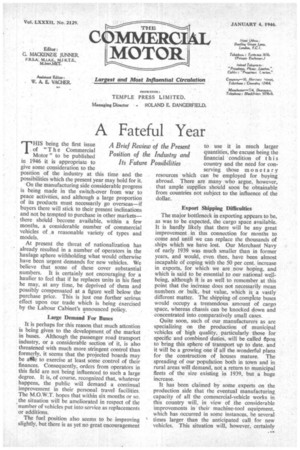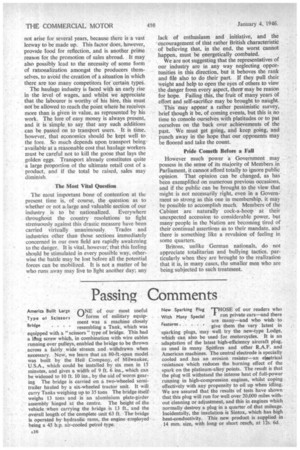A Fateful Year T HIS being the first issue of "T
Page 17

Page 18

If you've noticed an error in this article please click here to report it so we can fix it.
h e Commercial Motor" to be published in 1946 it is appropriate to give some consideration to the position of the industry at this time and the possibilities which the present year may hold for it.
On the manufacturing side considerable progress is being made in the switch-over from war to peace activities, and although a large proportion of its products must necessarily go overseas—if buyers there will stick to their present inclinations and not be tempted to purchase in other markets— there should become available, within a few months, a considerable number of commercial vehicles of a reasonable variety of types and models.
At present the threat of nationalization has already resulted in a number of operators in the haulage sphere withholding what would otherwise have been urgent demands for new vehicles. We believe that some of these cover substantial numbers. It is certainly not encouraging for a haulier to feel that if he replaces units in his fleet he may, at any time, be deprived of them and possibly compensated at a figure well below the purchase price. This is just one further serious effect upon our trade which is being exercised by the Labour Cabinet's announced policy.
Large Demand For Buses It is perhaps for this reason that much attention is being given to the development of the market in buses. Although the passenger road transport industry, or a considerable section of it, is also threatened with much more stringent control than formerly, it seems that the projected boards may be Ate to exercise at least some control of their finances. Consequently, orders from operators in this field are not being influenced to such a large degree. It is, of course, recognized that, whatever happens, the public will demand a continual improvement in their personal travel facilities. The M.O.W.T. hopes that within six months or so. the situation will be ameliorated in respect of the number of vehicles put into service as replacements or additions.
The fuel position also seems to be improving slightly, but there is as yet no great encouragement to use it in much larger quantities, the excuse being the financial condition of this country and the need for conserving those monetary resources which can be employed for buying abroad. There are many who argue, however, that ample supplies should soon be obtainable from countries not subject to the influence of the dollar. Export Shipping Difficulties • The major bottleneck in exporting appears to be, as was to be expected, the cargo space available. It is hardly likely that there will be any great improvement in this connection for months to come and until we can replace the thousands of ships which we have lost. Our Merchant Navy of early 1939 was much smaller than in former years, and would, even then, have been almost incapable of coping with the 50 per cent. increase in exports, for which we are now hoping, and which is said to be essential to our national wellbeing, although it is as well to remember at this point that the increase does not necessarily mean numbers or bulk, but value, which is a vastly different matter. The shipping of complete buses would occupy a tremendous amount of cargo space, whereas chassis can be knocked down and concentrated into comparatively small cases.
Quite soon, such of our manufacturers as are specializing on the production of municipal vehicles of high quality, particularly those for specific and combined duties, will be called anon to bring this sphere of transport up to date. and it will be a growing one if all the wonderful plans for the construction of houses mature. The spreading of our population both in town and in rural areas will demand, not a return to municipal fleets of the size existing in 1939, but a huge increase.
It has been claimed by some experts on the production side that the eventual manufacturing capacity of all the commercial-vehicle works in this country will, in view of the considerable improvements in their machine-tool equipment, which has occurred in some instances, be several times larger than the anticipated call for new vehicles. This situation will, however, certainly not arise for several years, because there is a vast leeway to be made up. This factor does, however, provide food for reflection, and is another prime reason for the promotion of sales abroad. It may also possibly lead to the necessity of some form of rationalization amongst the producers themselves, to avoid the creation of a situation in which there are too many competitors for certain types.
The haulage industry is faced with an early rise in the level of wages, and whilst we appreciate that the labourer is worthy of his hire, this must not be allowed to reach the point where he receives more than is given in value, as represented by his work. The lure of easy money is always present, and it is simple to say that any such additions can be passed on to transport users. It is time, however, that economics should be kept well to the fore. So much depends upon transport being available at a reasonable cost that haulage workers must be careful not to kill the goose that lays the golden eggs. Transport already constitutes quite a large proportion of the ultimate retail cost of a product, and if the total be raised, sales may diminish.
The Most Vital Question The most important bone of contention at the present time is, of course, the question as to whether or not a, large and valuable section of our industry is to be nationalized. Everywhere throughout the country resolutions to fight strenuously against this drastic measure have been carried virtually unanimously. Trades and industries other than those sections immediately concerned in our own field are rapidly awakening to the danger. It is vital, however, that this feeling should be stimulated in every possible way, otherwise the battle may he lost before all the potential forces can be mobilized. It is not a matter of he who runs away may live to *fight another day; any lack of enthusiasm and initiative, and the encouragement of that rather British characteristic of believing that, in the end, the worst cannot happen, must be energetically combated.
We are not suggesting that the representatives of our industry are in any way neglecting opportunities in this direction, but it behoves the rank and file also to do their part. If they pull their weight and help to open the eyes of others to view the danger from every aspect, there may be reason for hope. Failing this, the fruit of many years of effort and self-sacrifice may be brought to naught.
This may appear a rather pessimistic survey, brief though it be, of coming events, but this is no time to console ourselves with platitudes or to pat ourselves on the back over achievements of the past. We must get going. and keep going, and punch away in the hope that our opponents may be floored and take the count.
Pride Cometh Before a Fall However much power a Government may possess in the sense of its majority of Members in Parliament, it cannot afford totally to ignore public opinion. That opinion can be changed, as has been exemplified on numerous previous occasions, and if the public can be brought to the view that might is not necessarily right, even in a Government so strong as this one in membership, it may be possible to accomplish much. Members of the Cabinet arc naturally cock-a-hoop• at their unexpected accession to considerable power, but many people in the Nation are becoming tired of their continual assertions as to their mandate, and there is something like a revulsion of feeling in some quarters.
Britons, unlike German nationals, do not appreciate totalitarian and bullying tactics. particularly when they are brought to the realization that it is, in many cases, the smaller men who are being subjected to such treatment.




























































